 |
Most women would probably agree that safety is a very important issue, mainly due to the common perception that the risk of becoming a victim of crime is greater for a woman than a man. Since the majority of offences committed against women in Bermuda are crimes of opportunity, the "key" to preventing such crimes lies in reducing those opportunities. Take away those opportunities and you automatically reduce the risks to yourself, your family and your property. As a woman you can further reduce those risks by simply following the advice contained in this brochure. |
Home Security
|
|
|
Every type of door and window found in a Bermuda home can be made secure, but it is important to know what type of lock to fit and why. Take steps to make your home as secure as possible. Follow the advice given in the Police 'Home Security' brochure. Here are just a few quick tips.
Doors - fit single cylinder deadbolt locks where there is no glass either in or beside the door, and double cylinder deadbolt locks where there is glass within arms reach of the lock. Install door viewers or 'peepholes' in your front and read doors. This will allow you to see who is at the door before it is opened.
Louvered glass doors can be protected by fitting metal mesh grilles in place of your existing fly screens (replacement grilles incorporate fly screens).
Windows - make sure that you select and install the correct type of lock on your sash windows. There are essentially three types of locks; wooden sash window locks, clamp locks for old style PVC windows and PVC sash window locks for modern style windows. Locks are also available for casement windows.
Secure louvered and awning windows by fitting expanding metal grilles in the window frames on the interior side.
When away from home - remember to also secure the upper levels of spilt-level homes. Don't make the mistake of only securing the lower levels.
Outside Lighting - make sure that you install good outdoor lighting, preferably at least 12' off the ground. Also consider installing sensor or passive infra-red security lighting units (P.I.R.).
Intruder Alarm Systems - for advice on a system to suit your particular needs, contact the Police Crime Prevention Unit 299-4286.
Moving into a new home? Change the locks or have them re-keyed by a locksmith.
 Going Away? Cancel all deliveries and let a neighbour know when and where you are going and for how long. Give your neighbour a telephone number where you can be reached in the event of an emergency. Also let your Community Beat Officer know that you will be away, so that he or she can keep an eye on your property while you are gone. Going Away? Cancel all deliveries and let a neighbour know when and where you are going and for how long. Give your neighbour a telephone number where you can be reached in the event of an emergency. Also let your Community Beat Officer know that you will be away, so that he or she can keep an eye on your property while you are gone.
In partnership with the community, the Bermuda Police Service has appointed Community Beat Officers throughout the island.
| Where to Reach Your Community Officers |
| Sandys, Southampton and Warwick |
234-1010
|
| Paget, Pembroke and Devonshire |
247-1704
|
| Hamilton, Smith's and St. George's |
293-2222
|
|
|
At Home
|
|
|
Always verify the identity of callers before allowing them into your home. Police, Belco and BTC employees all carry identity cards and are required to show them if requested. If you have any doubts, you should deny the person access and ask him or her to call again.
Do not respond to obscene phone calls - hang up the receiver immediately. Never enter into conversation as it is usually an emotional reaction that the offender wants. Should calls persist, record the dates and times of the calls and notify the Police. If possible record the calls to play back to the Police.
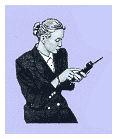 Never admit to a stranger over the telephone that your are alone in the house. Never admit to a stranger over the telephone that your are alone in the house.
Do not leave outgoing messages on your answering machine stating that you are not home. Instead, say that you are unable to come to the phone.
During the hours of darkness give your home a 'lived-in' appearance. Draw the curtains or close the blinds so that prowlers cannot see inside. If you do go out for the evening, leave a radio or television playing.
Keep a 12oz. airhorn or similar warning device handy to sound in case of an emergency. A 3oz. airhorn is ideal to keep in your handbag or in the glove compartment of your car, however it has a limited range when used indoors.
Consider joining or starting a Neighbourhood Watch Group in your area. For a free advisory brochure contact your nearest Police Station.
'U' Mark your valuables including your motorcycle and boat accessories.
Living alone? List only your last name and initials in the telephone directory and on your mailbox.
Do not leave spare keys outside in so called 'secret hiding places'.
Don't leave telltale signs that you are away from your home (such as notes pinned to your door).
Keep your doors and windows locked - even when you are at home. Windows should be fitted with secondary locks, so that they can be locked in the open position to allow for ventilation (the open space should not exceed 5 inches).
|
At Work
|
|
|
 Always keep your handbag in a safe place, locked away inside a drawer or filing cabinet. Always keep your handbag in a safe place, locked away inside a drawer or filing cabinet.
Never leave bank notes, keys, cheque books or other valuables in coat pockets or on your desktop.
|
Walking or Shopping
|
|
|
It is worth noting here that individuals who appear confident and assertive tend to discourage attackers.
NEVER count money on the street. Keep the actual cash you carry to a minimum and try to use cheques or credit cards when possible.
Know the contents of your purse, i.e. amount of money, denominations, driver's licence and other ID, so that it can be easily identified if lost or stolen.
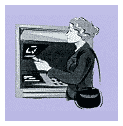 Avoid using bank ATM machines when alone or at night to withdraw large sums of cash. Be wary of strangers who may be standing close by. Avoid using bank ATM machines when alone or at night to withdraw large sums of cash. Be wary of strangers who may be standing close by.
NEVER eave your handbag unattended in a shopping cart, on a shop counter or on the floor by your feet.
Don't draw attention to yourself by wearing expensive jewellery when you go shopping.
Walk with a companion if at all possible. Generally attackers do not want to confront more than one person.
If you need to walk alone, either early in the morning or late at night, stay alert. It is important to be aware of your surroundings at all times. Devices such as walkmans limit your ability to stay alert.
Try to choose your routes with care and travel on well-lit streets. Avoid setting patterns by altering times and routes whenever possible.
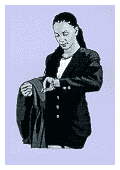 DON'T take shortcuts through isolated areas. DON'T take shortcuts through isolated areas.
If possible carry a cellular phone, a small flashlight and some kind of warning device (for example a 3oz airhorn).
Consider purchasing a personal attack alarm (P.A.A.). These alarms are relatively inexpensive and easy to operate. Keep alarms where they are easily accessible and not at the bottom of your handbag. Most alarms can be worn through the use of a strap or clipped to a belt. This will allow for quick access and use (sports models are also available for athletes).
If you think you are being followed, make it obvious to the person following you that you know he is there. Walk towards a group of people, cross the road and/or take a different street. Don't be concerned about having to make plenty of noise if you need to - shout as loud as you can or use your P.A.A. Your personal safety is the main issue.
|
Socializing
|
|
|
 When out socializing, if you are in the company of people whom you do not know very well, do not let your drink out of sight and do not accept drinks from strangers.GHB (Gamma Hydroxybutyric acid) or Rophynol (also known as 'date rape drugs')can be slipped into your drink without your knowledge. These drugs are difficult to detect as they are colourless, odourless and tasteless. When out socializing, if you are in the company of people whom you do not know very well, do not let your drink out of sight and do not accept drinks from strangers.GHB (Gamma Hydroxybutyric acid) or Rophynol (also known as 'date rape drugs')can be slipped into your drink without your knowledge. These drugs are difficult to detect as they are colourless, odourless and tasteless.
Remember - alcohol impairs your judgment. Don't allow yourself to get into predicaments. Always have a friend with you - use the buddy system.
Do not accept rides from strangers and always carry enough money for a cab ride home.
|
Driving
|
|
|
Avoid leaving cash or valuables in an unattended vehicle (even if secured in a locked car or the glove compartment). Never leave anything of value in plain view.
Don't leave your handbag on view in your cycle basket when you ride your bike. Ensure that it is secured and out of sight.
Always drive with your doors locked and always lock your vehicle (especially your cycle) even if you will only be away for a few minutes.
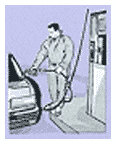 Check your gas tank indicator regularly and never allow yourself to run out of gas. Check your gas tank indicator regularly and never allow yourself to run out of gas.
Don't pick up hitch-hikers.
Carry a cellular phone in case of an emergency - you should however, refrain from using one (if at all possible) while operating a vehicle.
After dark always park in well-lit areas as close as possible to your destination. Approach your vehicle with your key in your hand.
At night time, before getting into your car, make sure that nobody is hiding inside the vehicle.
If you think that you are being followed by someone in a car or on a cycle, drive to the nearest Police Station or to a place where there are groups of people.
|
Arriving Home
|
|
|
 As you approach your home, have your key in your hand to let yourself inside as quickly as possible. If you think someone is inside your home who shouldn't be there, DON'T GO INSIDE. Instead, use your cellular phone or go to a neighbour's home and call the Police on 9-1-1. As you approach your home, have your key in your hand to let yourself inside as quickly as possible. If you think someone is inside your home who shouldn't be there, DON'T GO INSIDE. Instead, use your cellular phone or go to a neighbour's home and call the Police on 9-1-1.
If you are confronted by an intruder inside your home. STAND ASIDE and give him the space to escape - don't stand in his way. After he leaves, telephone the Police immediately. Remember that the instinct of most intruders when discovered is to get away as fast as possible.
If someone is prowling around outside your home, try to stay calm. Telephone the Police and state your name, address and telephone number. Stay on the line - the Police officer receiving the call will probably wan to ask you more questions. Don't forget to provide the officer with details about your home, such as whether it is a single or split level, and the colour of the outside walls and blinds. If your car is parked in the driveway, inform the officer of the make and licence number, in order to assist the Police in finding your house.
|
Intruding Upon the Privacy Of A Female
|
|
|
Any man who intrudes upon the privacy of a woman or girl in such a way as to be likely to alarm, insult or offend the woman or girl whose privacy he intrudes upon, is guilty of an offence under Bermuda law.
Specifically the Criminal Code defines the offence as follows:
| (a) |
he accosts or follows her; or |
| (b) |
he utters any word, makes any sound or gesture, or exhibits any object, or commits any indecent act, intending the word or sound to be heard by her or the gesture or object or the indecent act to be seen by her. |
Even though we now have a Stalking Act in Bermuda, the offence of intruding upon the privacy of a female remains on the statute books and is still used by the Police.
|
The Stalking Act
|
|
|
Stalking refers to an individual or group of people, who without lawful authority, engage in conduct with the intention of causing physical or mental harm to the victim or inducing in the victim apprehension or fear for the victim's safety or for the safety of a connected person. A 'connected person' is someone who has a domestic connection with a victim of stalking.
The offence consists of one or more of the following acts committed over a period of time.
| • |
Following the victim or connected person. |
| • |
Telephoning the victim or connected person. |
| • |
Sending electronic messages to the victim or connected person. |
| • |
Interfering with property in the possession of the victim or connected person. |
| • |
Entering the place of residence, employment or any other place frequented by the victim or connected person. |
| • |
Loitering outside the place of residence, employment of a victim or connected person, or outside any place frequented by the victim or connected person. |
| • |
Keeping the victim or connected person under surveillance. |
Persons who are being or who have been stalked may apply for a protection order, if:
| • |
The stalker has been convicted, or |
| • |
Criminal proceedings have begun but are not concluded, or |
| • |
The court is satisfied that criminal proceedings are imminent. |
Where a person is found guilty of stalking and it is proved on the balance of probabilities that he was;
| • |
In possession of an offensive weapon; or |
| • |
In breach of a protection order, the maximum penalty can be increased to 3 years or to a fine not exceeding $5,000, or to both. |
If you know the identity of the stalker, an application to obtain a protection order can be made through your lawyer, legal aid, or the Women's Resource Centre.
Note: An 'offensive weapon' is an article made or adapted for use causing injury to the person, or intended for such use by the person having the article in his possession.
|
If Assaulted
|
|
|
There are no hard and fast rules on what you should or should not do, but depending upon the circumstances, you could try one or all of the following;
Try to deter your would-be attacker by making plenty of noise.Sound your warning device or scream as loud as you can.
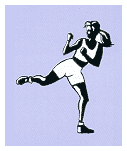 If you need to resort to physical violence to defend yourself, fight back any way that you can. Aim for your attacker's vital organs, his eyes and groin. Use a sharp object such as a key, umbrella or comb to protect yourself. Alternatively scratch or bite your attacker. If you need to resort to physical violence to defend yourself, fight back any way that you can. Aim for your attacker's vital organs, his eyes and groin. Use a sharp object such as a key, umbrella or comb to protect yourself. Alternatively scratch or bite your attacker.
If you are being dragged against your will, fall to the ground and roll - this will make you harder to control and may enable you to break free.
Do not allow an attacker to take you to another location. Your chances of escape are greater at the initial point of contact, rather than at the attacker's preferred location.
Note: Chemical mace and pepper spray are illegal in Bermuda and it would be an offence for you to use it to defend yourself, even if attacked. Mace and pepper spray have been made illegal specifically to stop offenders from having access to it and from using it against their intended victims. Consider using articles that you carry in your handbag everyday, to ward off attackers. In the past women have used hairspray, perfume and even mouth spray to defend themselves. The law permits you to use such force as is resonably necessary to make an effectual defence against an assault.
|
REMEMBER Every situation is different. ONLY YOU can decide what course of action is best to take.
|
It is not necessarily being suggested here that women shouldn't 'always fight back' if assaulted. Depending on the attacker's state of mind, fighting back may increase his level of violence. This is a personal decision that you will have to make based upon the situation - be realistic about your ability to protect yourself. Whatever you decide, you must mentally prepare to handle the consequences of your actions.
|
Passive Resistance
|
|
|
Depending upon the circumstances (for example you may be ill, injured or a long way from the nearest house), you may have to consider offering passive resistance as an alternative to fighting back.
By 'passive resistance' we mean to offer no physical resistance. Instead, try telling your assailant that you are ill, have a disease, you are pregnant or menstruating. Ohter forms of passive resistance designed to 'turn off' you attacker include urinating and forcing yourself to vomit.
|
Sexual Assaults
|
|
| There are many kinds of sexual assault and any woman, man, girl or boy can be the victim of such an assault. The offence formally know in Bermuda as rape, is probably the most talked about form of sexual assault. Age is not necessarily a deterrent to a rapist, and quite frankly, rapists know no bounds. |
After A Sexual Assault
|
|
|
If you, a family member or friend are ever the victim of a sexual assault, or any crime for that matter, you are urged to CALL THE POLICE AT YOUR EARLIEST OPPORTUNITY. Remember that without a complaint the Police are virtually powerless to respond and take action. Indeed your failure to report an assault may indirectly result in another person being assaulted in the future, or the assailant might attack his past victim(s) again.
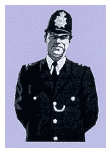 Unless you or the victim require medical attention, wait for the Police to arrive or go directly to any Police Station. Do not rinse or bathe yourself (or the victim) after a sexual attack, and do not change clothing - otherwise you might be destroying vital evidence necessary to the successful prosecution of the offender(s). Unless you or the victim require medical attention, wait for the Police to arrive or go directly to any Police Station. Do not rinse or bathe yourself (or the victim) after a sexual attack, and do not change clothing - otherwise you might be destroying vital evidence necessary to the successful prosecution of the offender(s).
Note: Cases of sexual assault involving women and girls are handled by Police officers who are specially trained in dealing with such offences. Whenever possible statements are taken in surroundings sympathetic to the victim.
|
Emotional Damage
|
|
 All victims of sexual assault suffer emotional damage to one degree or another and such persons are urged to seek expert counselling. The names and telephone numbers of the facilities offering counselling are listed below. All victims of sexual assault suffer emotional damage to one degree or another and such persons are urged to seek expert counselling. The names and telephone numbers of the facilities offering counselling are listed below. |
Descriptions
|
|
|
Whether you witness a crime or are unfortunate to be the victim yourself, it is vitally important that you are able to provide the Police with an accurate description of the criminal.
If you can remember the phrase DIFFERENCES, NOT SIMILARITIES when trying to describe someone, then you won't go far wrong. For example, did you remember anything about the person's accent and th words that he or she said? Did the person have any birthmarks, tattoos, scars or odd mannerisms? Was he or she left handed or right handed? Was he on foot or did he ride a cycle or drive a car? What colour was the vehicle and what was the licence number? Finally, in which direction was the vehicle heading when last seen?
|
Important Phone Numbers
|
|
| Police (Emergency) |
911
|
| Fire (Emergency) |
911
|
| Ambulance (Emgergency) |
911
|
| Police Inquiries |
295-0011
|
| Vulnerable Persons Unit |
247-1678
|
| Somerset Police Station |
234-1010
|
| Hamilton Police Station |
247-1704
|
| Southside Police Station |
293-2222
|
| Women's Resource Centre |
295-3882
|
Centre Against Abuse
|
292-4366
|
| Centre Against Abuse (24 Hour Hotline) |
297-8278
|
| Hospital |
236-2345
|
Teen Services
|
292-4598
|
| Support Groups (women only) |
292-4366
|
| Mental Health Advice (Hotline) |
236-3770
|
| Crime Stoppers |
800-8477
|
|
|
|